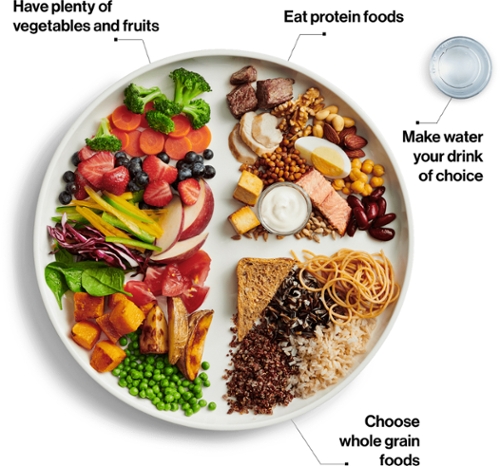
Welcome to Emory University’s Student Health Clinic nutrition resource page! We are clinically trained, registered dietitians who understand that nutrition can be complex. To help simplify, we created this site to provide science-informed, trustworthy resources to help you sort out the truth among all the “noise” out there.
If you would like to meet one-on-one to discuss any nutrition related topics or diets, please schedule an appointment with us! All currently enrolled students are granted 15 free nutrition visits per year. Visit the Student Patient Portal to schedule.
General Nutrition Guidelines

Benefits of Using the Plate Method
- Improved energy and focus (this include academic and athletic performance)
- Higher vitamin and mineral intake (no need for supplements!)
- Improved digestion (less risk of constipation or diarrhea)
- Better hydration (we get hydration from fruits and vegetables in our diets as well as liquids)
- Reduced risk of developing our most common chronic health conditions (type 2 diabetes, heart disease, high cholesterol, etc.)
- Better sleep and mood.
We recommend a well-rounded approach to nutrition that has science-backed, evidence-based research supporting its health benefits. We've compiled a list of nutrition approaches with those qualifications below. What you may notice is that all of the listed diets have the same core values of limiting processed foods, increasing fruits, vegetables and whole grains, and finding balance in meals. Where each one differs is in the philosophy; one may speak to you more so than the other. Read on to see which one fits you best.
Whole Food Plant-Based: this approach emphasizes the foods known to offer protective properties including fruits, vegetables, whole grains, legumes, tubers, beans, etc. In doing so, it often crowds out processed foods and many animal-based products (think meats, cheeses, milk, eggs, etc.). There is a wide spectrum of plant-based nutrition with some followers having small amounts of fish or poultry in their diets or maintaining dairy in limited quantities. There are no rules, only guidelines asking the person to increase fiber rich, whole foods and minimize their processed foods and animal-based products as often as they can. Learn more about it here.
Mediterranean: a Mediterranean diet has a long history of health benefits; it emphasizes plant-based foods like fruits, vegetables, beans, whole grains, olive oils, and includes some seafood, red wine, poultry, and focuses on social connectedness as a core tenant. You can learn more about how a Mediterranean diet can protect your health and find recipes and guidelines here at Med Instead of Meds.
Flexitarian: also known as semi-vegetarian, a flexitarian is a meat reduction approach typically limiting intake to 3 times per week or less. This diet acknowledges that meat is a high protein, fat and micronutrient source but also considers the ethical and environmental impact of a diet that includes animal products. There are no firm guidelines on eating approaches except for reduction in meat intake but we would encourage adopters to focus on the high fiber and nutrient richness of whole foods versus processed options.
Vegan or Vegetarian: a vegan diet excludes all animal products (including honey and gelatin) and may also promote avoidance of any animal derived products like leather. There are many reasons a person may be a vegan or vegetarian including health, ethical, religious or environmental reasons (or perhaps a combination of many). A vegetarian diet avoids meat but may still allow eggs, dairy or honey. Both diets can produce health and weight benefits if they emphasize whole, unprocessed foods most of the time.
Below you will find guidance on what the science shows these trending diets are appropriate for and some of the unknown risks with adopting them. We recommend a balanced approach and tailored nutrition recommendations if you are trying to change your weight as many trending diets are difficult to follow.
Keto diet: Originally developed to treat pediatric epilepsy, this diet is very high fat and very low in carbohydrate with the goal of getting a person into a state of ketosis. Ketosis occurs when your body’s primary fuel source shifts from carbohydrates to ketone bodies which are produced from a breakdown of fats. This is considered a state of dysfunction and is very difficult to achieve without medical supervision. Common reactions are muscle loss, low energy, bad breath, headaches and worse. These diets are only recommended for children with epilepsy that is not responding to medication. There is some research supporting use in ultra-endurance athletes, but this data is inconsistent.
Intermittent Fasting: also known as IF, this approach limits the times you can eat. Common versions are the 5:2, time-restricted (ex. 16/8, 12/12), or complete fasting on alternating days. A 5:2 approach uses 2 days per week with very low-calorie intakes (often below 600 per day), the rest of the days are normal. Time-restricted fasting provides a window of time for eating and fasting. Many times, we can consider going to bed as fasting since we do not eat. Some people extend that window by choosing an 8 hour or 12 hours of times to eat (7 AM to 7 PM is common). Complete fasting is when you do not consume any food for alternating days (but do stay hydrated). Fasting can be useful for weight loss, type 2 diabetes and decreasing late night eating but is also often difficult to maintain. These diets are not recommended for athletes, people with eating disorders, pregnancy or breastfeeding, or anyone with a nutrition dependent disease like type 1 diabetes.
Student Health Services
Emory University Student Health Services (EUSHS) provides outpatient care for enrolled Emory students with a valid Emory ID card. International student's spouses, Domestic Partners and unmarried children over 18 years of age are also eligible for primary medical care if they are currently enrolled in the Emory/Aetna Student Health Insurance Plan.
Patient Portal
Schedule appointments, request prescription refills, send secure emails and more.